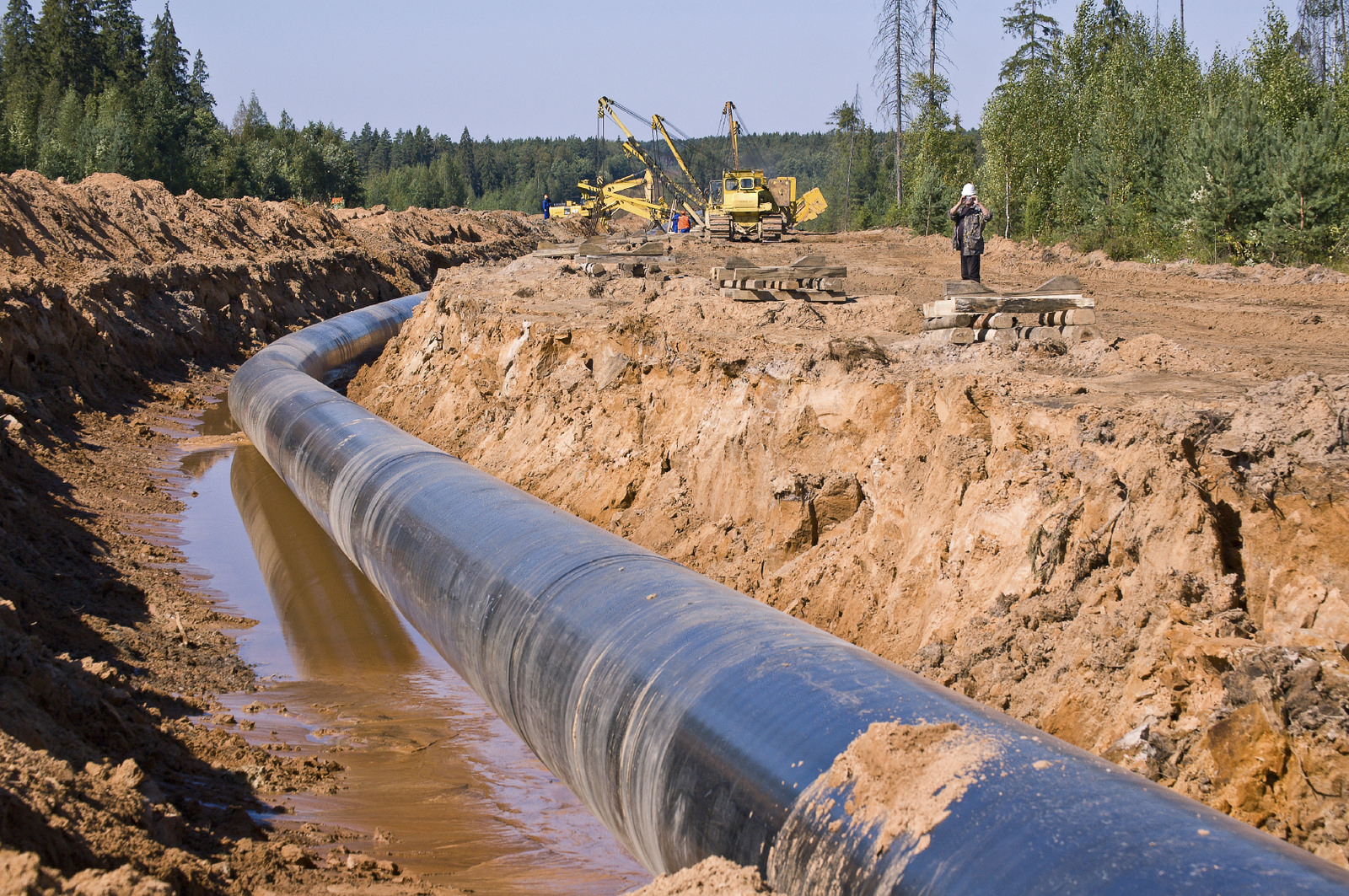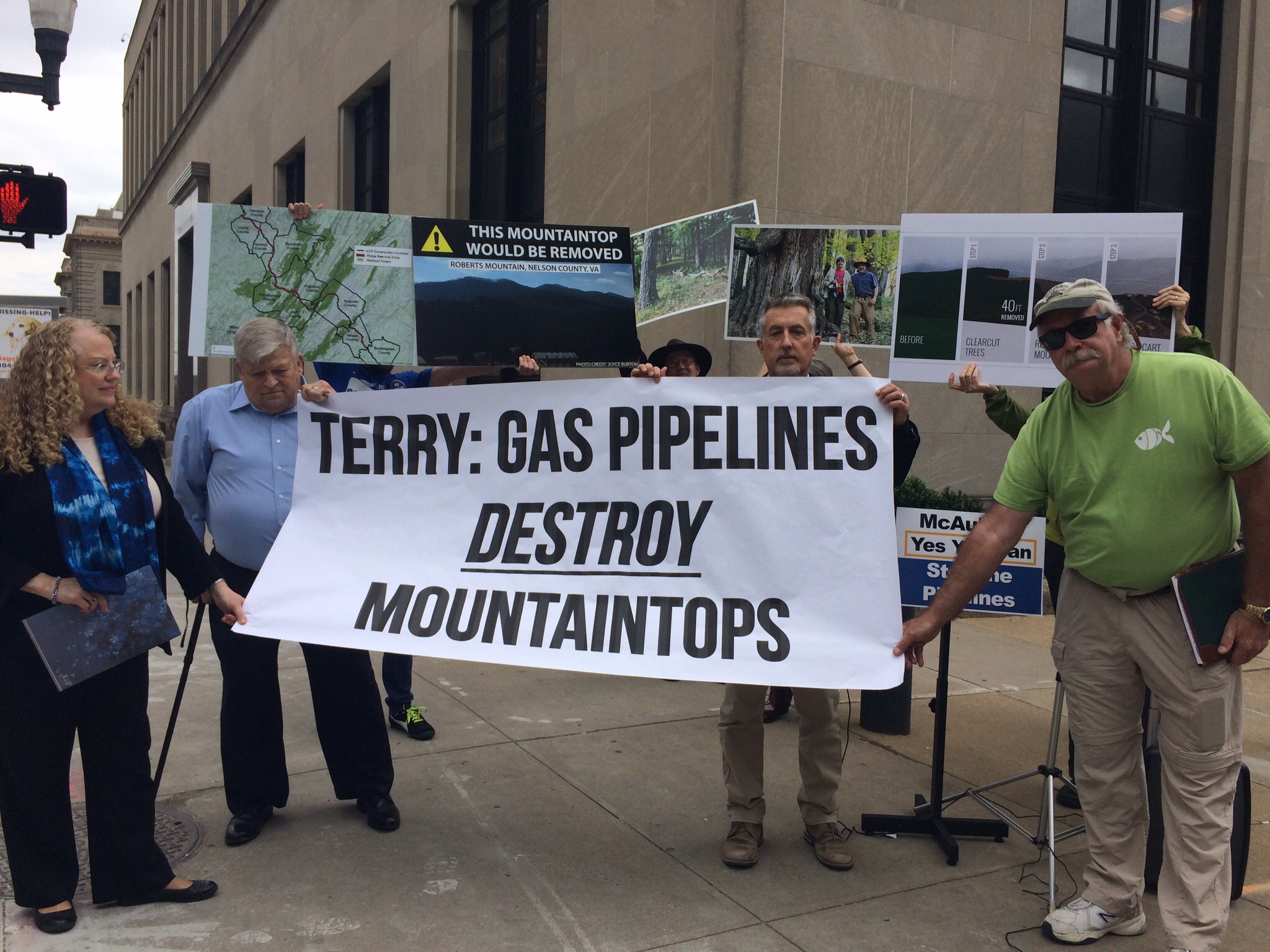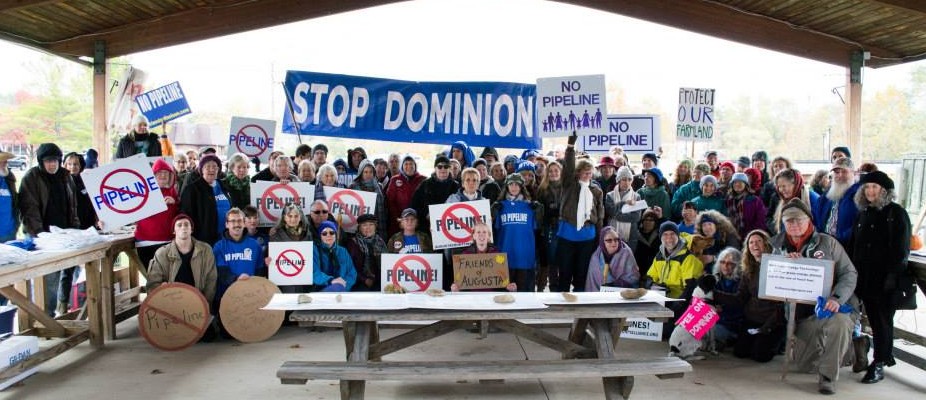Seven weeks ago, we applauded the McAuliffe Administration’s announcement that it would conduct thorough, site-specific reviews of the impacts that the Mountain Valley and Atlantic Coast pipelines would have on water quality. After years of public pressure, the Department of Environmental Quality (DEQ) was finally planning to give these massive pipelines the thorough environmental review they deserve.
On Wednesday, DEQ abandoned that promise.
The agency says it made a mistake. It was never planning to look at the pipelines’ impacts to Virginia streams, DEQ now says. Instead, the agency wants to abdicate that responsibility to President Trump’s Army Corps of Engineers, which is expected to issue a blanket one-size-fits-all permit that does not look at each individual stream crossing, and therefore does not fully protect these water bodies.
This is Gov. McAuliffe’s responsibility! DEQ works for him. Tell McAuliffe the state MUST do more to protect VA’s waterways.
Back in April, the DEQ was unequivocal. We will look “at each wetland, stream crossing … separately, to determine specific requirements that would be necessary” to protect Virginia waterways, a DEQ spokesperson told the Roanoke Times.
This was hopeful news. If the DEQ carries out thorough, site-specific reviews, we believe it will have had no choice but to reject these disastrous pipelines. There’s no doubt that building the pipelines across steep, well-watered, forested mountain landscapes will harm water resources, including heavy sedimentation of streams, alteration of runoff patterns and stream channels, disturbance of groundwater flow, and damage to springs and water supplies.
The Army Corps process does not involve site-specific analyses. We have no confidence that the Corps’ permit will be sufficient for such a complex project across the state’s steepest mountains. The DEQ is evading its responsibility to conduct thorough reviews of all threats to water quality posed by these pipeline projects.
The state must do more to protect Virginia’s waterways from pipelines. Call McAuliffe today.
Virginia Military Veterans Speak Out Against Fracked-Gas Pipelines
New letter signed by military veterans from all branches announces opposition to the Atlantic Coast Pipeline and Mountain Valley Pipeline
RICHMOND, Virginia– Military veterans from across Virginia released a letter today opposing two proposed fracked-gas pipelines: Dominion Energy’s Atlantic Coast Pipeline and EQT’s Mountain Valley Pipeline. These pipelines would cross through pristine areas of Virginia, taking private property by use of eminent domain, removing mountain ridgetops, and threatening valuable drinking water resources. The veterans view this as contrary to their service to protect and defend the freedom and security of American citizens.
Their letter, released on Thursday, May 25th, is signed by 14 Virginia veterans from all five branches of the military. The veterans signing the letter state: “We stand together to support our citizens and our Constitution. We stand against [the Atlantic Coast Pipeline and Mountain Valley Pipeline] because we stand against the seizure of private property for corporate gain. Both of these proposed pipelines would create new sacrifice zones and abuse eminent domain to strip property owners of land that, in many cases, has been in their families for generations. This direct attack on the constitutional rights of landowners goes against the oath we all took when we volunteered to serve this great country.”
“As veterans we took an oath to support and defend the constitution of the United States from all enemies, foreign and domestic,” said Adam Fischbach, Hospital Corpsman Second Class, U.S. Navy. “The Constitution was written to protect the rights of American citizens. Now, when we allow a private corporation such as Dominion to overpower individual rights in the name of unjustified business profits, we have lost what it means to be American and to our right of life, liberty and the pursuit of happiness. We, as veterans must take a stand to ensure that individual rights are not stepped on in the name of economic advancement for the fossil fuel industry.”
The letter discusses the battle between indigenous communities and police forces at Standing Rock, when thousands of military veterans showed up to form a human shield around the water protectors when their communities were under threat from the Dakota Access Pipeline. The signatories state: “We will continue to embody that spirit to protect our communities against the Atlantic Coast and Mountain Valley Pipelines.”
“Pipeline companies target communities like Newport, Virginia because they think we won’t make trouble for them due to our rural values,” said Russell Chisholm, US Army, Desert Storm and Newport resident. “They ignore the fact that people of faith live here. Veterans and active duty service members live here and we take our oath to ‘support and defend’ as a life-long promise. We stand up when Americans are threatened. You better believe we are going to stand up when fellow veterans are threatened.”
In the letter, released on behalf of Veterans Service Corps., the signatories renounce the pipelines for ensuring “that Virginia remains shackled to fossil fuel extraction for another generation.” They call for action on climate change, noting a “proven demand for a future that is powered by clean energy and innovation.”
“It’s time we stopped looking backwards at dirty energy technologies of the past and started creating jobs in energy efficiency, solar, and wind energy,” said Dave Belote, Colonel (retired), U.S. Air Force. “Hampton Roads should be the center of a mid-Atlantic offshore wind industry that can employ thousands, maximize the use of our port facilities, and point the way to a clean, resilient future.”
The joint letter will be sent to Governor Terry McAuliffe as well as each of the five Virginia gubernatorial candidates: Lieutenant Governor Ralph Northam, Tom Perriello, Ed Gillespie, Virginia Senator Frank Wagner, and Corey Stewart.
The letter can be read in full here.
Contact: Jamshid Bakhtiari, jamshid@chesapeakeclimate.org, (757) 386-8107.
Photo at the top from Flickr user Joe Brusky with a Creative Commons license.
Governor McAuliffe Needs A Compass. We'll Give It To Him.
I’ve been a proud hiker of the Appalachian Trail since I was a boy. And I always take my trusty compass. It’s gotten me out of lots of jams on the trail.
Now, on June 2nd, on the eve of National Trails Day, I want to invite you – my fellow Virginia trail hikers — to Governor Terry McAuliffe’s house so we can give HIM a compass. The Governor supports two massive pipelines for fracked gas that, if built, would dramatically harm the Appalachian Trail. Terry McAuliffe, in other words, is clearly LOST, and he needs our help. Come to Richmond on June 2nd with all your backpacking gear – and bring a compass to give the Governor.
I’m a member of the Potomac Appalachian Trail Club, and there are three things hikers like me depend on.
The first is access to clean, reliable water along the trail. Without water, we cannot hike.
The second is our appreciation for beautiful mountain vistas. That’s why we hike. Along the Virginia AT, those vistas include places like Angel’s Rest, the Dragon Tooth, and Kelly Knob.
But the Atlantic Coast Pipeline and the Mountain Valley Pipeline for fracked gas could harm all this, each crossing the AT with great impact. With the Governor’s support, companies like Dominion Energy want to plow these pipelines through geologically fragile areas that could threaten not only water along the trail, but water for farmers and communities across 13 counties.
As for vistas, this is horrifying: the companies want to clear cut and then blast off the tops of at least 38 miles of ridgetops – some within view of the AT — across Virginia and West Virginia to make room for the pipelines’ wide paths. They will decapitate these mountains. And the views and ecological health of places like Angel’s Rest and Dragon Tooth will be severely impacted.
Which is why Governor McAuliffe needs the third thing critical to hikers: a compass! He needs to chart a new course that opposes these pipelines and protects our Appalachian Trail.
Won’t you join me on Friday June 2nd, in Richmond? We’ll give the Governor our compasses and ask him to do the right thing.
RSVP TODAY!
If you can’t make it to Richmond, give McAuliffe a call right now to tell him to REJECT these pipelines. Or, share this video with all your friends:
Victims Of Mountaintop Removal From Dominion’s Proposed Atlantic Coast Pipeline Speak Out In Front of Governor McAuliffe’s Office
Following news that Dominion’s Atlantic Coast Pipeline would obliterate 38 miles of ridgelines in Virginia and West Virginia, several severely impacted residents and business owners spoke at a Richmond press conference detailing their concerns and calling on McAuliffe to reject the pipeline.
RICHMOND, VA — Virginia residents whose lives and property would be destroyed by mountaintop removal — triggered by Dominion Resources’ proposed fracked-gas pipeline — spoke out at a press conference today outside Governor Terry McAuliffe’s office. They demanded the Governor use his full legal authority to stop Dominion’s plan to explode entire ridgetops along 38 miles of mountains to build the controversial Atlantic Coast Pipeline.
According to a new briefing paper, Dominion Resources intends to blast away, excavate, and partially remove entire ridgetops along 38 miles of Appalachian mountains as part of the construction of the Atlantic Coast Pipeline. Similar impacts – although not yet fully inventoried – are expected to come from the construction of a second pipeline to the south: the Mountain Valley Pipeline led by the company EQT.
During the press conference, speakers demanded the Governor use his regulatory power to halt both proposed pipelines. They detailed how their communities will be directly impacted by the shattered ridgelines that will come with the construction of the Atlantic Coast Pipeline. They explained how the Atlantic Coast Pipeline would force businesses to close, lower property values, and harm the tourism economy. Additionally, they detailed how the pipeline would cause irrevocable harms to the natural environment, and increase the threats of water pollution and landslides.
“The proposed pipeline has been a 24/7 nightmare for my wife and I since we first learned of it,” said Bill Limpert, retired environmental regulator and property owner Little Valley, Bath County. “The Atlantic Coast Pipeline would cut our property in half. Then it would leave an 125-foot-wide scar for 3,000 feet along Miracle Ridge, which is now covered by old growth forest — some of it never cut. It would lower our property value by at least 50 percent, and our property would become a toxic asset. It would also leave us well within the blast zone of the pipeline, and we — and a number of our neighbors — are trapped at the head of Little Valley in the evacuation zone with no chance of escape or rescue in a pipeline accident. We would be forced to abandon our retirement home and property if the pipeline is constructed as proposed. We simply cannot live next to this dangerous pipeline or witness the destruction it would bring upon our property, and we will not relent in fighting it with everything we have.”
Engineering and policy experts have examined documents submitted by Dominion to the Federal Energy Regulatory Commission (FERC) and, using GIS mapping software, found that Dominion would require mountaintops to be “reduced” by 10 to 60 feet along the proposed route of the pipeline. For perspective, the height equivalent of a five-story building would be erased in places from fully forested and ancient mountains.
In addition to the expected mountaintop removal, Dominion has yet to reveal how it intends to dispose of at least 247,000 dump-truck-loads of excess rock and soil—known as “overburden”—that would accumulate from the construction along just these 38 miles of ridgetops.
Nancy McMoneagle, President and Executive Director of The Monroe Institute, stated: “The Monroe Institute has done business in Nelson County since 1979, contributing almost $2 million annually to Nelson County’s economy, employing around 50 staff and service contractors. If the Atlantic Coast Pipeline comes through Institute property as is now projected, our operations would be decimated, all these jobs would be lost, and thousands of our customers throughout the world would be left without our services.”
Dominion has submitted a proposal to FERC to build a 42-inch diameter pipeline that would transport natural gas from West Virginia into Virginia and North Carolina. Dominion has attempted to paint the Atlantic Coast Pipeline as an “environmentally-friendly” project. However, its proposed construction method and route selection across and along steep mountains is unprecedented for the region—if not the country—and is viewed as extreme and radical by landowners, conservationists, and engineers. Similar impacts – although not yet fully inventoried – could come from the construction of a second pipeline to the south: the Mountain Valley Pipeline led by the company EQT Midstream Partners, LP.
“Dominion is taking our land in order to destroy the mountain ridge directly over our home,” said Joseph W. McMoneagle, President of the New Land Home Owners Association. “Blasting on Roberts Mountain will destroy this mountain’s stability, and permanently disrupt the delicate underground water supply to more than half a dozen homes in our subdivision. Stripping old growth trees and underbrush will open the mountain ridge to heavy erosion, and future mud and landslides that will overrun our natural mountain springs and streams. Most of our residents are over age sixty, so we have a frequent need for emergency vehicles traveling unhindered in and out of our valley. Because our roads are excessively narrow and steep, it will be impossible to pass Dominion’s pipeline construction trucks during one of those emergencies. Altering our roads will be taking our land without the excuse of a pipeline. I ask the Governor to put an immediate stop to this nonsense before someone is seriously hurt.”
The full briefing paper is available here.
###
Contact:
Denise Robbins, 240-396-2022, denise@chesapeakeclimate.org
Anne Havemann, 240-396-1984, anne@chesapeakeclimate.org
Community and Conservation Groups Blast FERC Findings on Fracked-Gas Atlantic Coast Pipeline
Community and Conservation Groups Blast FERC Findings on Fracked-Gas Atlantic Coast Pipeline
WASHINGTON, D.C. – Dozens of local groups and public advocacy organizations today condemned federal regulators for ignoring evidence that the proposed 600-mile Atlantic Coast Pipeline is not needed and puts lives, communities, drinking water supplies, private property, publicly owned natural resources and the climate at unacceptable risk.
The Federal Energy Regulatory Commission has released its draft environmental review of the $5 billion pipeline spearheaded by Dominion Resources. For two years, the proposal has sparked fierce opposition from hundreds of landowners in the three states — including farmers, business leaders, Native American tribes and rural African-American communities — who reject the company’s plan to take their land without their consent. Their fight has drawn comparisons to the ongoing citizen-led resistance at Standing Rock against the Dakota Access Pipeline, and to the fight in Nebraska to stop the Keystone XL Pipeline.
The Atlantic Coast project would pump fracked gas across West Virginia, Virginia and North Carolina, harming communities, water resources, private property, historic sites, and iconic public treasures including the Blue Ridge Parkway and Appalachian Trail. The groups say FERC failed to honestly assess these impacts and disregarded evidence that the project would lock consumer into decades more reliance on dirty fossil fuels.
An independent study shows there is enough existing gas supply in Virginia and the Carolinas to meet consumer demand through 2030 — negating the need for the massive pipeline and the harm it would trigger. The Atlantic Coast Pipeline is one of six major pipelines proposed for the same region of West Virginia and Virginia, where experts warn the gas industry is overbuilding pipeline infrastructure. However, FERC ignored this evidence in its draft Environmental Impact Statement while also failing to assess the cumulative effects of the pipelines. The groups also fault the agency for dismissing clean energy alternatives.
In response to requests from numerous elected officials and organizations, FERC has extended the usual 45-day period for public comments; the deadline is April 6, 2017.
While legal and environmental experts are continuing to review the document, they have initially identified major gaps in FERC’s analysis, including:
- The core issue of whether the massive project is needed to meet electricity demand, and whether alternatives including energy efficiency, solar and wind would be more environmentally responsible sources;
- A complete analysis of the cumulative, life-cycle climate pollution that would result from the pipeline;
- A full accounting of the negative economic consequences to communities, including decreased property values, loss of tourism revenue and other factors;
- Any accounting of other environmental and human health damage from the increased gas fracking in West Virginia that would supply the pipeline; and
- Thorough, site-specific analysis of damage to water quality and natural resources throughout the pipeline route.
Citizens along the route of the Atlantic Coast Pipeline — along with landowners in the path of the Mountain Valley Pipeline, a 301-mile fracked-gas project proposed in the same region — vow they will continue to build resistance to stop them.
Statements from community, environmental and legal experts:
Nancy Sorrells, Augusta County Alliance, 540-292-4170, info@augustacountyalliance.org “Every foot of this route has a victim: a family that would be displaced, a farmer who would impacted, schoolchildren whose safety is compromised, and residents whose drinking water is a risk. And for what? Not for energy independence or to turn on the lights, but rather for the profit of a private corporation.”
Chad Oba, Friends of Buckingham, Cofounder and Chair, 434-969-3229, chado108@me.com “Buckingham County is being targeted for a massive, noisy, polluting compressor station — the project’s only one in Virginia — in an area of former slave plantations that is densely populated by mostly African-American Freedmen. FERC’s review omits virtually all of the cultural resource reports we submitted, effectively erasing us from the record even as we bear the greatest burden. The leaders of Standing Rock have pledged strong kinship with us as another example of environmental racism.”
Ericka Faircloth, a Lumbee Indian member of the grassroots group EcoRobeson. (For interview requests, contact Hope Taylor with Clean Water for NC at hope@cwfnc.org ) “Folks who live in Robeson County, one of the poorest and most diverse counties in North Carolina, are especially vulnerable to the empty promise of jobs. Residents of low wealth will be most severely impacted by higher utility rates to pay for the pipeline, and by lowered value for their land. Potential drinking water contamination, loss of forests and disruption of cultural sites are among the risks many that poor communities are expected to ‘deal with’ to make way for a project that’s only about profit.”
Joe Lovett, Appalachian Mountain Advocates, Executive Director, 304-520-2324, jlovett@appalmad.org “We’re appalled FERC has once more refused to conduct a combined review of the massive slate of pipelines proposed to move fracked gas out of our region. FERC has the extraordinary power to grant ACP the right to take private property for private profit. Yet FERC decided that it didn’t have to do the hard work necessary to determine whether the ACP is necessary. Such a lack of diligence is truly remarkable.”
April Pierson-Keating, Mountain Lakes Preservation Alliance (W.Va.), 304-642-9436, apkeating@hotmail.com: “This pipeline would add insult to injury in West Virginia, where we are already dealing with water and health impacts due to fracking. It would lock us into decades more fossil fuel pollution when we should be moving to renewable energy. This pipeline would continue the harm done by extractive industry to the most vulnerable of us — low-income people, the elderly, the disenfranchised.”
Peter Anderson, Virginia Campaign Coordinator, Appalachian Voices, 434-293-6373, peter@appvoices.org “This pipeline would carry highly pressurized gas across miles of steep mountain terrain that is prone to rock slides and contains many headwater streams. Routing this pipeline across the Appalachian Trail and vulnerable water resources poses an unacceptable risk, especially given that it’s not needed to meet our energy needs.”
Anne Havemann, General Counsel, Chesapeake Climate Action Network, 240-396-1984, anne@chesapeakeclimate.org: “The Atlantic Coast pipeline will trigger a massive new wave of greenhouse gas pollution and climate damage. Yet, FERC’s review once again fails to add up the full impact, ignoring cumulative climate pollution from fracking wells and the ultimate burning of the gas.”
Greg Buppert, Senior Attorney, Southern Environmental Law Center, 434-977-4090, gbuppert@selcva.org “Dominion’s Atlantic Coast pipeline will not only irreparably alter our natural terrain but it is also unnecessary. The current route carves through the mountains in an area the U.S. Forest Service calls, ‘the wildland core of the central Appalachians’, for a pipeline that will lock generations of Virginians into dependence on natural gas. We already have the gas needed to bridge us from dirty to clean energy-existing infrastructure can meet our demands for natural gas for at least the next fifteen years. This is a Dominion self-enrichment project, not a public necessity.”
Kirk Bowers, Pipelines Campaign Manager, Virginia Chapter, Sierra Club, 434-296-8673, kirk.bowers@sierraclub.org “The DEIS is deficient in many respects and needs to be re-issued. It imposes absurd pre-conditions for serious consideration and fails to affirmatively seek out alternatives that would meet the presumed need while greatly mitigating harms to the public and environment, land-takings and even costs. Likewise, the Commission needs to stop approving all projects that have contract support and take seriously its duties to consider all factors affecting the public convenience and necessity, including protecting environmental interests and private property rights not to have land seized for privately owned pipelines just because another private party contracts for service.The ACP is not needed to keep the lights on, homes and businesses heated, or industries in production.”

Thousands Demand An Accurate Review Of Mountain Valley Pipeline
Thousands of citizens, local and conservation groups demand FERC do an accurate review of the Mountain Valley Pipeline
Groups call on FERC to issue completely revised Draft EIS
WASHINGTON, D.C. – Over the past three months, more than 17,000 people in the affected region — along with tens of thousands of others across the country — have sent comments or signed petitions to the Federal Energy Regulatory Commission demanding the agency do a thorough, accurate and unbiased review of the proposed Mountain Valley Pipeline, and ultimately reject the project. Local groups and environmental organizations submitted hundreds of detailed comments to the Federal Energy Regulatory (FERC) outlining numerous reasons finding the Draft Environmental Impact Statement substantially lacking information for meaningful review.
The proposed pipeline passes through important habitat in the Jefferson National Forest and would have devastating impacts on the New River Valley and surrounding areas. There are many substantial deficiencies in the DEIS that must be corrected through the issuance of a completely revised DEIS, including the failure to fully evaluate the need for the MVP and the failure to fully evaluate the impacts to water resources, wetlands, cultural resources, threatened and endangered species, and climate change implications. Correcting these deficiencies will require significant new analysis and the incorporation of high quality and accurate information regarding MVP impacts.
Legal and environmental experts have filed review comments of the nearly 2,600-page document that identified major gaps in FERC’s analysis, including:
- Failure to identify, consider, and analyze all reasonable alternatives. The DEIS fails to consider alternative routes and options, including a “no action” alternative, as required by the National Environmental Protection Act. The Council on Environmental Quality refers to the alternatives analysis section as the “heart of the EIS”.
- Failure to consider climate change impacts. FERC does not analyze the significance of the total annual greenhouse gas emissions in any meaningful way.
- Failure to address the need for the MVP. Despite the clear requirement to discuss the need for the MVP project in the DEIS, FERC says that it will not address project need until after the environmental analysis is over.
- Failure to provide adequate environmental information. The DEIS lacks sufficient information about the MVP and its potential environmental impacts on a wide variety of resources, including water resources, wetlands, cultural resources, threatened and endangered species, and climate change implications.
In addition to significant flaws, there is a significant amount of information regarding other environmental impacts that is missing from the DEIS that will not be provided by the applicants in a manner that facilitates meaningful public disclosure and participation.
David Sligh, Conservation Director, Wild Virginia, 434-964-7455.
“FERC must revise the draft EIS to correct gross deficiencies in information and flawed analyses. Wild Virginia calls on the federal Bureau of Land Management and the U.S. Forest Service to insist on a new and adequate DEIS from FERC, or to fulfill their legal duties and prepare their own.”
Ben Luckett, Senior Attorney, Appalachian Mountain Advocates, 304.645.0125, bluckett@appalmad.org.
“We’re shocked the FERC has continued to disregard its federal duties and fast track this project — especially given major gaps in the agency’s understanding of the pipeline’s impacts, as well as any need for it in the first place. FERC has the extraordinary power to allow MVP to take private property for its shareholders’ own private gain. Just because the job of evaluating the impacts of such a massive project is difficult doesn’t mean that FERC may cut corners and ignore its important duty to the public. FERC should not proceed forward, sacrificing family land and other private property, without fully analyzing this destructive and unnecessary pipeline.”
Lara Mack, Virginia Field Organizer, Appalachian Voices, 540-246-9720. lara@appovices.org.
“FERC woefully underestimated the impacts the Mountain Valley Pipeline will have on the Appalachian mountains, wildlife habitat, water resources, and communities. If FERC did it’s job correctly, with the public interest in mind, it would see this project for what it is — a dangerous boondoggle.”
Andrew Downs, Regional Director, Appalachian Trail Conservancy, 540.904.4354, adowns@appalachiantrail.org.
“Through a deficient level of planning and environmental impact assessment, the MVP project represents a threat not only to the purpose and values of the Appalachian National Scenic Trail but, by undermining the United States Forest Services’ protection of the AT, it represents a fundamental and existential threat to the entire National Trails System”
Anne Havemann, General Counsel, Chesapeake Climate Action Network, 240-396-1984, anne@chesapeakeclimate.org.
“FERC’s draft environmental review utterly ignores the pipeline’s full impacts on the climate. The limited–and opaque–review fails to fully account for methane pollution from increased fracking that the pipeline would trigger, from leakage along the route, and from the ultimate burning of the gas. The pipeline would fail the White House’s climate test. FERC must revise its review to include the pipeline’s full lifecycle of climate pollution, and consider clean energy alternatives.”
Ellen Darden, POWHR Co-Chair, Montgomery County, Va. 540-230-1091
greennrv.ellen@gmail.com.
“The people of Appalachia stand united in an unprecedented interstate coalition: Protect Our Water, Heritage, Rights (POWHR), to make clear to the Federal Energy Regulatory Commission, the United States Forest Service, the US Army Corp of Engineers, US Fish and Wildlife Service and the Bureau of Land Management that Mountain Valley Pipeline has failed to establish a need for this destructive project.
FERC’s Draft Environmental Impact Statement summarily ignores the detailed, credentialed hydrogeologic, economic, historical preservation and cultural attachment research submitted by the POWHR coalition and hundreds of landowners opposed to MVP. Rather than interfering and obstructing public opposition to MVP, FERC must review the entire body of scientific research submitted and reject this project.”
Kirk A Bowers, PE, Pipelines Campaign Coordinator, VA Chapter, Sierra Club, 434.296.8673, kirk.bowers@sierraclub.org.
“The Draft EIS is blatantly biased. It makes sweeping unsubstantiated claims of the need for the pipeline while dismissing any and all potential adverse effects. The applicant provides cursory responses to data requests in a perfunctory manner without analyses or serious consideration of the adverse effects of the proposed pipeline. The applicant has failed to make reasonable efforts to avoid and minimize adverse effects on communities, landowners and ecosystems impacted by the proposed pipeline. In light of the incompetent and unprofessional manner in which the application has been handled by MVP LLC, it is incumbent on FERC to reject the application.”







